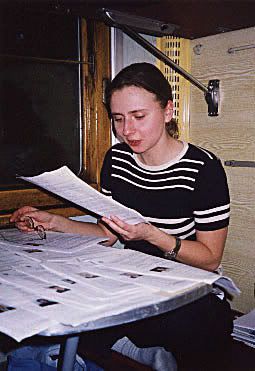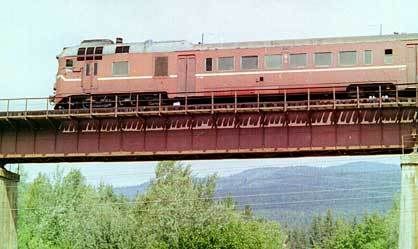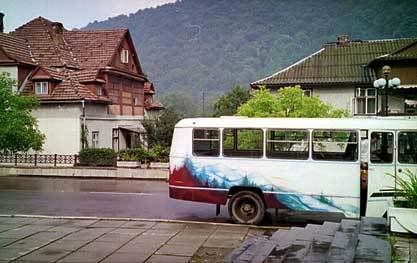3 A.M. Magazine

March 1999: At work in a makeshift office on the Uzhgorod-Kyiv train.
My friend and a former colleague was once asked to do a skit on our typical working day at one American NGO in Ukraine. She began by describing a typical morning, when a woman in railway uniform wakes us up at 7 a.m., barging into our compartment and blaring, "Get up, we're approaching the sanitary zone, I'm locking the restrooms in 15 minutes, hurry!"
This thunder-woman is called “provodnitsa” in Russian and may be described as a grotesque imitation of a flight attendant. Aggressive, intrusive, unkempt, she inhabits most Ukrainian trains. Their second-class cars, at least. For all I know, some of my former American and Ukrainian colleagues working on an exchange program funded by the U.S. government, bear a closer resemblance to flight attendants, with their upright wheeler suitcases and with all the class they manage to maintain despite feeling kind of groggy at times, as their travel schedules grow too intense.
In the first six months on this job, I spent 32 nights in a four-passenger train compartment and got used to thinking about it as a job within a job. Then I lost count for a while. When I decided to move on after two years, I updated my glorious statistics and learned that I had been on 60 trips to 26 locations all over Ukraine.
Not all of these trips required trains. Moreover, at some point, our management looked into what one of our directors had called "life quality issues" and let us travel first class for a while. Nevertheless, a second-class, or kupe, car is like second home to me, a pathetic and unfriendly place where you'd never put on those cozy slippers and would be forever grateful to one of your American colleagues for having supplied you with multiple little bottles of Instant Antibacterial Hand Sanitizer that "kills germs without water" and contains moisturizers and Vitamin E.
An American journalist who used to live in Ukraine once wrote me: "I hope you don't have to take any overnight trains. I did that from Kyiv to Lviv and it was pretty hair-raising. I kept thinking the train would jerk and I'd fall out of bed."
Ukraine is a relatively big country, usually compared to France in size, and all the trains we took were overnight. Most trains leave after 6 p.m. and arrive early in the morning, which allowed us to have unimpaired work days despite arrivals and departures. To counteract staff exhaustion, we used to have a "frequent rider" system: for every 5,000 kilometers that we covered, we were getting one day off. Before I marked my first anniversary with the organization, I had traversed 22,500 kilometers, or 14,000 miles. According to my calculations, it was enough to commute just about 70 times between New York City and Washington, D.C., to accumulate such mileage.

Summer 1999: Relaxing after work, in Lviv.
I've seen seasons change outside the train windows. I've heard dozens of foolish Russian pop songs about failed love affairs, broken hearts and drunken days and nights, songs I'd never listen to voluntarily but couldn't escape on Ukrainian trains. I've seen people who didn't have the equivalent of 70 cents to pay for the train bedding and had to sleep on filthy mattresses. I've missed at least a dozen football games that our team played and that I really wanted to watch but couldn't because I was on a train. I've participated in a number of useless conversations with my compartment-mates who all seemed to be amateur philosophers with gloomy and unpractical yet unromantic views of life.
Being on a train was like diving: I took a deep breath and held it until I emerged from under the water. Life was getting suspended when I was on a train. I could read a book or try to take a nap, but this didn't count as conscious existence. Only in the morning, when I arrived at my destination and took a shower, everything around me revived and regained motion, and the sound of the train wheels stopped echoing in my head.
Later, my mind would gradually blend the memories of this parallel nightmarish life into a room where it stored my less significant memories. But a few of the train memories are outstanding and supply some flesh for the skeleton of the train segment of my life.
CLOISTERED ENCOUNTERS
The first trip in mid-March of 1999 made me realize how spoiled I was, living in the center of a crowded capital city. The weather was gloomy, no spring was in sight yet, and the train stopped at a town called Novograd-Volynskiy. I counted eight stray dogs at the station. I also noticed a few men and women who were neither leaving nor waiting for anyone to arrive. They looked as if this train station was the only and the best place in town to hang out.
By the time I went on my second and third trips, everything was green. I could hear birds and crickets as we were rushing along a narrow line of trees separating the railroad from the fields. I felt like getting off the train at some small deserted station, pretending that I was going to buy cigarettes or water, and never coming back. Let it go with all my bags and heroic colleagues. I could survive on my own for a while. When I got too lonely, hungry or dirty, I could always hitchhike back home to Kyiv.

Summer 2000: A train in Yaremche, Western Ukraine.
The experience with cockroaches on an Uzhgorod train was the most dramatic. Uzhgorod is a town I am in love with, but it is approximately 19 hours away from Kyiv. Once, I was sent there on my own. I shared a compartment with a young woman instead of the usual three people, of whom at least one needs company to have a drink, talks you to death and snores during the night. The young woman took out her contact lenses and quietly went to sleep right after the train began to move, giving me enough space and silence to write letters to my friends. It was 11 a.m.
An hour later I decided to eat my sandwiches. I took a bite, turned to look at the scenery outside the window and saw a big shiny cockroach staring at my food from across the table.
I spent the next nine or ten hours first with napkins in my hand, then with pieces of toilet paper, then with pages from my notebook, and finally, when I ran out of all that, with a train towel. My compartment-mate didn't bother to put her lenses back in when she woke up from her midday nap and just sat there on her bunk, whimpering at the sight of huge cockroaches that were visible to her. I saw dozens of small ones, too, and was killing them all.
The best weapons for hunting cockroaches in the road conditions are soft napkins and toilet paper. Shoes are too cumbersome for this task, and certain types of sole may not be appropriate, giving cockroaches a chance to escape. Notebook paper and towels cause the same problem.
I've always been afraid of cockroaches but on that train, close to midnight, I realized that my fear and squeamishness were gone: I suddenly saw myself holding a banana in my left hand as my right hand set about killing a huge cockroach with a napkin.
I've turned into a sniper, and though I didn't count, a good estimate would be 500 dead cockroaches. The whole experience reminded me of a computer game where you kill three, and five more are coming at you, you kill them, and ten more are coming from three different directions simultaneously.
I finally went to sleep after midnight, dreaming claustrophobic dreams and hoping that the surviving cockroaches wouldn't try to hold a wake on my head during the night.
We arrived in Uzhgorod around 7 a.m. the next morning, and I went to a hotel to take a shower. I had a breakfast consisting of an omelet and four cups of coffee, and at 9 a.m. I was working.
SPY STORIES
Sometimes I wondered if people we worked with were aware of what our lives were like. Did they ever realize that we had just stepped out of a lousy train and checked into a lousy hotel? There were times when we did not even have time to go to a hotel.
The Donetsk train, for example, leaves Kyiv at 7:30 p.m. and is supposed to reach its final destination 14 hours later. But it is often late. Once, my colleague and I had to change and eat right where we were supposed to work an hour after the train finally arrived in Donetsk. We ate cheese and canned rice dolma with our fingers, and the participants of our program who came early were knocking on the door every two minutes until we let them in. We worked for five hours, went out for a nice dinner and then went back to the train station and spent 14 hours more on a train back to Kyiv.
On the "Donetsk, Part Two: Kherson" trip, the scenario was just slightly different: the train was late, but we had an hour to have brunch, change into professional-looking clothes and brush our teeth in a restaurant's bathroom. I rejoiced our agility and wondered what the bored small-town waitresses could possibly think about this masquerade. They might have imagined that my colleague was an American spy on a mission and I was his local aide, a traitor, and that we were dropped off in Kherson by a submarine. I didn't have time to polish this story because we had to rush to work.
Four hours later, though, whoever might have been watching us had more reasons to believe we were spies. We returned to the same restaurant, ate hastily, jumped into a cab eight minutes before the train's departure, made the driver nervous by cursing local streetlights, somehow reached the train station without killing any pedestrains, found our train and climbed into the nearest car. We walked through the train to our car and as soon as we stepped into our compartment, the train set off on its return 15-hour journey to Kyiv.
"WATER" CLOSET
Someone had once shared an avant-garde bathroom design idea with me: wouldn't it be cool to purchase an old written-off train toilet and sink, wash them, paint them into a nicer color and install them at your home! I liked the idea in theory but couldn't imagine having something in my home that I had spent so much time fearing to touch.

Summer 2000: A bus in Yaremche, Western Ukraine.
For two years, I avoided using train restrooms in the morning. I don't think I'll ever get rid of this habit, even when I can travel by trains less frequently, having quit my job. It feels better to let your bladder come close to bursting and not have freshness in your mouth until you reach the hotel. In the evening, when the train departs, a tiny room containing a metal toilet and a sink with a construction resembling a tap, is dry and locked. But within an hour, after the train exits the "sanitary zone" surrounding the urban area, the bathroom gets unlocked and the first passengers use it. Soon the floor is all wet, an old useless rag is soaked and unable to absorb any more of the liquid, and it only gets worse.
A typical visit to a train bathroom includes the train's violent shaking, your attempts to simultaneously keep balance and keep your clothes away from that liquid on the floor, fear of touching anything and the necessity to do so, and sometimes the danger of being hit by an aluminum pail precariously hanging right above your head.
A sign on the wall reminds you that in order to flush the toilet you should "push the pedal below." When you push it, you realize how fast the train is going. It gets louder in the bathroom, and you see the tracks through an opening in the toilet that lets the water out and the fresh evening air in.
There is a small hole in the bathroom floor that also allows passengers to see how fast the train is. Once, when I was little, I was going to Crimea with my mother's friend, and she accompanied me to the bathroom and told me to pee into this hole because the toilet was too high for me. I guess this explains why there is always so much liquid on the floor, what kind of liquid it is and why there is never enough of it to get the bathroom flooded.
METAMORPHOSIS
In Kyiv, there is a building that, according to legend, has a room designed as a 19th-century train compartment because its first owner met his future wife on a train. I used to think that this was such a romantic way to commemorate a happy event. Now, however, I just find it very eccentric.
I also thought that one of my co-workers was eccentric when I found out that he would be returning from a trip two hours before his wedding. It took me some time to convince him to lobby for a substitute for that trip. I insisted that he would be tired and stressed out, and would annoy his bride, and that the train might be late and his own wedding was too important to miss.
For my wedding, I would like to rent a car and drive myself to the place where they register new couples. I miss driving, I cannot afford to buy a car and I would be too timid to drive it in this part of the world. By renting a car, I could make myself a nice present and have a unique and thrilling experience, enough to remember the wedding for the rest of my life. But I'd never choose to spend my last night as a single woman on a Ukrainian train. And I wouldn't want to commemorate the eventful two years with an American NGO by investing into a trailer and embellishing it with bunk beds.
Trains have changed me. I used to think that eccentricity was a precious gift given to a very limited number of individuals. But now I also know that there are instances when it's better to be boring, mainstream, conservative and conventional, and keep away from trains.
No comments:
Post a Comment